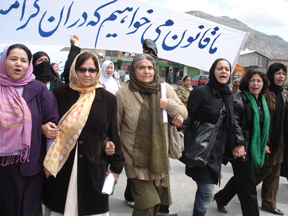Mohtarama
 AFGHANISTAN / 2012 / Dari / B&W / Blu-ray / 60 min
AFGHANISTAN / 2012 / Dari / B&W / Blu-ray / 60 min
Directors: Malek Shafi’i, Diana Saqeb
Script, Photography, Producer: Malek Shafi’i
Editing: Esmaeel Adivi
Sound: Diana Saqeb
Source: BASA Film
Herāt, 2010—the wife of a burka seller holds a unique view of the garment. Kabul, 2009—a group of women organize a protest for women’s rights, and are spit on. Mazar-e Sharif, 2011—a 24 year-old woman who married at age 12 sees herself in the works of a female poet who died tragically for love. The directors, also activists, meet these women one-by-one, conversing with them, empathizing with them, and trying to find a way forward. They do so in hope that one day, being a woman will no longer be a crime. The film’s title Motharama comes from a colloquial term for “woman.”
[Director’s Statement] Diana and I started making the film in 2009, when Afghans had more hope for their future. We set up an office and produced films, published a monthly magazine on cinema and organized film festivals and workshops. These activities were unable to satisfy our passion for helping the rehabilitation of Afghanistan, so we also initiated activities on women’s rights. We organized numerous meetings about women and tried to encourage them to go outside, protect the streets, and stand for their rights.
We faced many problems since we belong to two different ethnic groups. We were almost jailed a couple of times. I noticed that Diana was stressed—not for herself, but for the other women her age that she had met, who were trying to open space to breathe. But the more they tried, the more they faced discomfort.
Women in Afghanistan face more challenges as they get more educated, on both a family and community level. People do not treat them well and hold expectations for them that are not equal to their needs. I tried to focus on Diana’s concerns in this film, and I also tried to follow other women in her same age group and education level to capture their challenges and to find out whether a “Women’s Movement” exists in Afghanistan.
Afghan women are standing against their tradition, culture, and religious oriented society, and they are working hard for a better life. I am still optimistic. I do not think that this is not our last collaboration together. I look forward to continuing our activism in the future.
 (From the left)
(From the left)Malek Shafi’i
Malek Shafi’i has been making documentaries for the past 12 years. He completed his education at the Baagh Ferdaws Islamic Filmmaking Center in Tehran and attended a film production course in the Netherlands. Returning to Afghanistan after 20 years of exile, he founded the Afghanistan Cinema Club BASA in 2006. Shafi’i is also founder and director of the Autumn Human Rights Film Festival. He organized the second and third Kabul International Documentary and Short Film Festival, as well as Second Take, a festival with a focus on gender and cinema.
Diana Saqeb
Diana Saqeb is a documentary filmmaker and women’s rights activist who has lived 24 years as an immigrant. For the past three years, she has been a resident of Kabul. She studied film at the Tehran Art Academy and is a member of BASA. Her first documentary 25 Percent follows six female members of the Afghan parliament and the challenges they face in their daily lives. Her second documentary Run Roobina Run is about Roobina Moqimyar, the first Afghan female athlete to participate in the Olympics.
